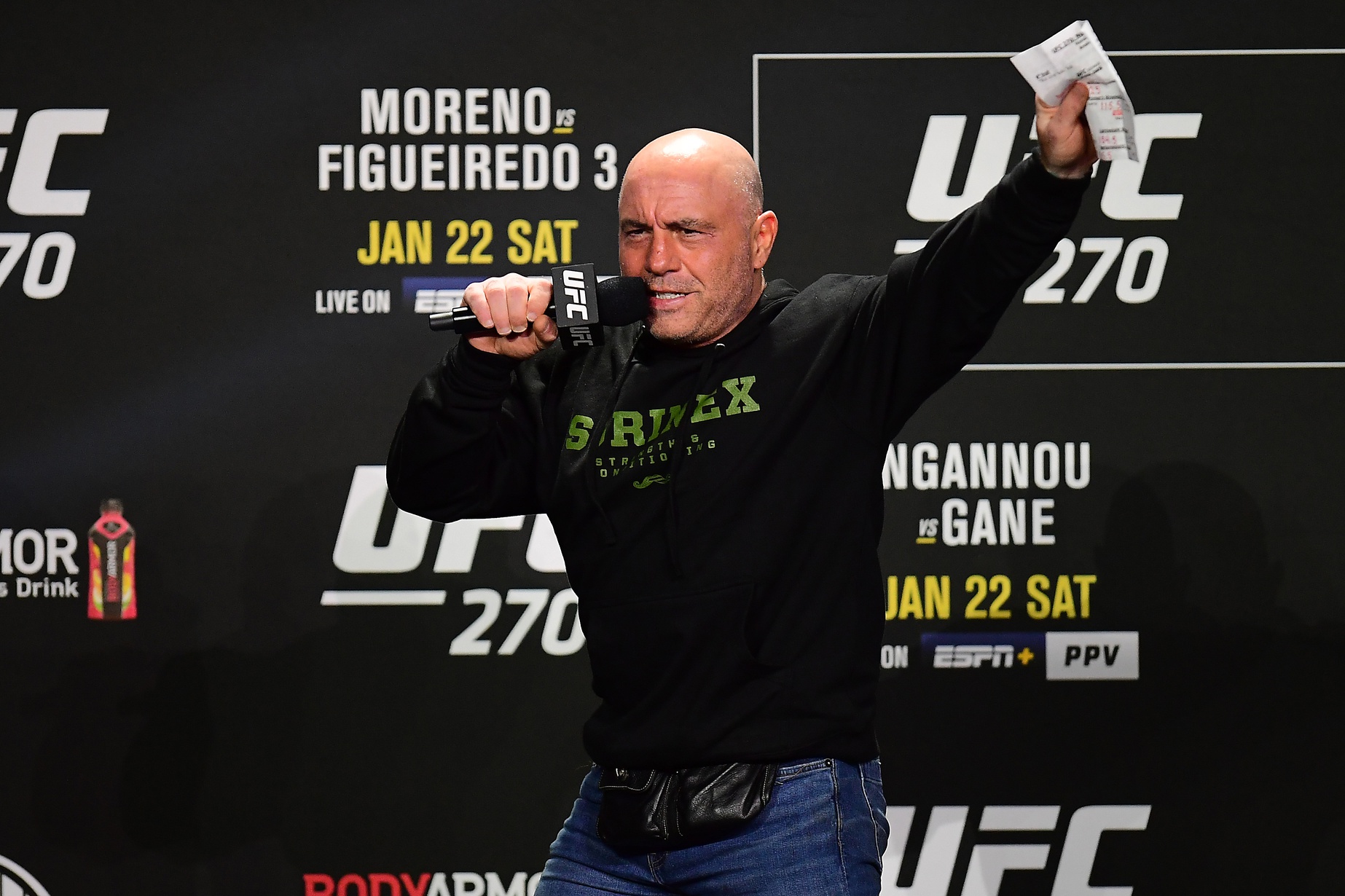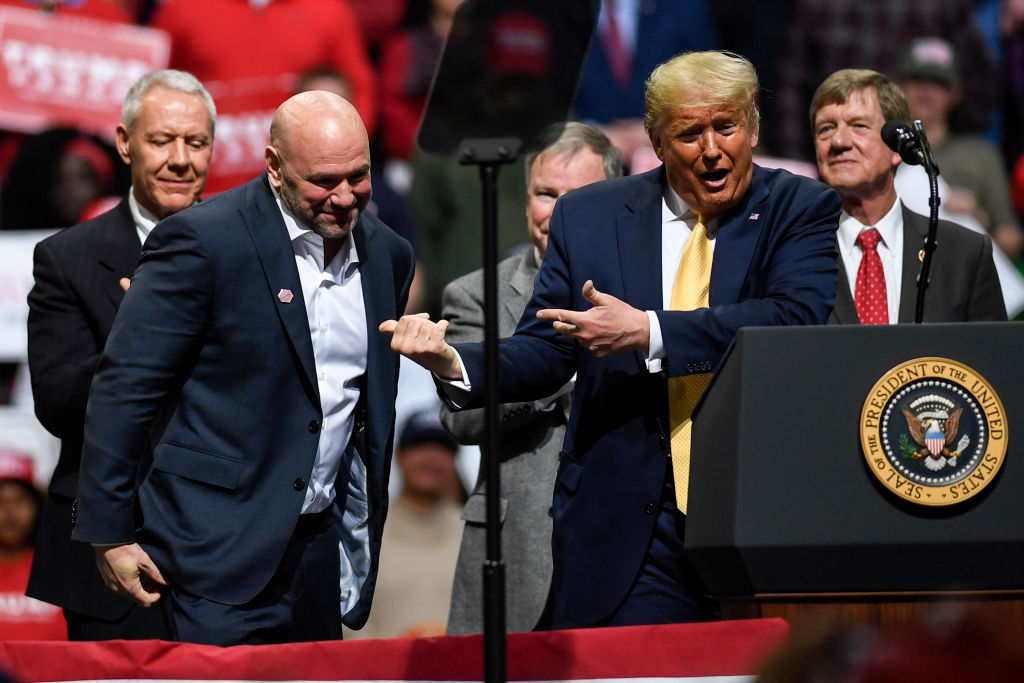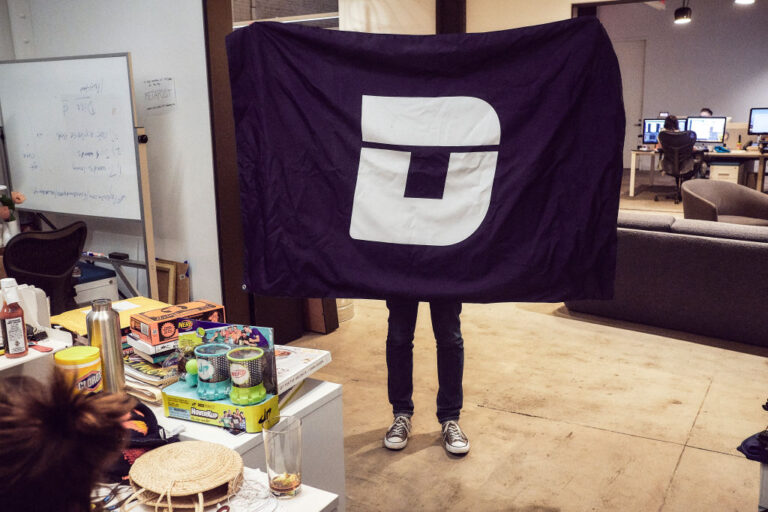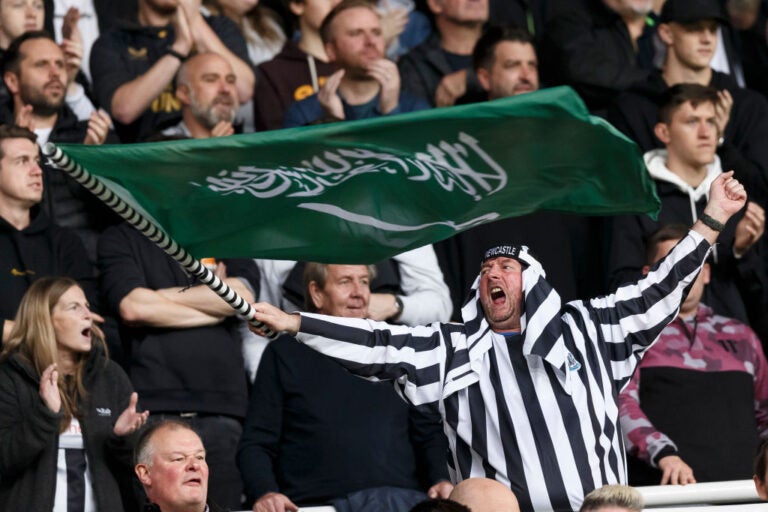Fight for the Right: Why So Many MMA Fighters Are Becoming Right-Wing Political Activists
Why this matters
In the U.S. and around the world, MMA's embrace of outsider sports fans and right-wing politicians has helped create a wave of athletes activating around extremist causes and conspiracies.
The American Top Team gym has long been considered a preeminent destination for aspiring mixed martial arts (MMA) fighters. Based in Coconut Creek, Florida, the academy has trained some of the sport’s most dominant competitors, many of whom have gone on to become champions in the world’s leading MMA organizations.
However, during the final weeks of Donald Trump’s 2020 presidential reelection campaign, the renowned gym played host to one of the strangest campaign events in the general election cycle: a “Fighters Against Socialism” rally.
The event, which was organized by the president’s namesake son, Donald Trump Jr., was part of a four-stop bus tour that made the rounds through Florida in October 2020 to deliver anti-socialist messaging aimed at the state’s Latino community. The tour featured Sen. Marco Rubio, as well as Ultimate Fighting Championship star Jorge Masvidal, who delivered an impassioned speech at each stop lamenting the “horrors” of communism and socialism.
“Obviously, I am not a politician,” Masvidal said at the tour stop at American Top Team, which drew more than 500 people, including several MMA fighters. “I may not be schooled in a lot of these political issues like some of you, but I do know Latinos. Latinos are not lazy people looking for a handout. Latinos don’t want free stuff. We want freedom.”
The Cuban-American fighter – son of a Cuban immigrant who fled his native land by floating to the Sunshine State on a tire – expressed profound concern over the political climate in the leadup to the 2020 presidential election. During another one of the tour stops, Masvidal implored attendees not to allow the Democrats to erode American freedoms.
“We either reelect President Trump and keep America great again, or we let Joe Biden and the radical left take us down the slippery slopes of socialism and misery,” Masvidal said.
While Masvidal was among the most recognizable athlete endorsements that Trump received at the time, he was far from the only MMA fighter who vehemently supported the controversial leader. Many fighters, including a handful of former Ultimate Fighting Championship champions, openly endorsed Trump and campaigned for him in various states, underlining a trend of MMA fighters pivoting to right-wing activism.
The phenomenon is not limited to Trump. Other politicians such as Florida Gov. Ron DeSantis also relied on prominent fighters to help spread their political messaging during the coronavirus pandemic, while authoritarian governments such as those in Brazil and Russia continue to enjoy the support of popular MMA fighters and champions.
There are numerous reasons behind MMA’s penchant for extremist, right-wing political action. The sport’s beginnings as a niche counter-culture activity, its growing popularity among conservative audiences, and the UFC’s embrace of Trump all contribute. So does the fact that MMA fighters are drastically underpaid. Unlike the vast majority of sports leagues and organizations, where athletes receive about half of league revenue, the UFC has historically paid out less than 20 percent of revenues to its fighters. While this highlights why fighters might be attracted toward politicking to make a quick buck, it also shows a clear choice by fighters not to engage in activism that might improve conditions in MMA and instead embrace right-wing political causes.
The Combatant-in-Chief
In November 2018, the UFC celebrated its 25-year anniversary by releasing a series of short documentaries highlighting some of the more important moments in the organization’s history. While the vast majority of the programs focused on the UFC’s founders and influential fighters, one particular documentary showcased the league’s history with Trump and his supposed role in saving the UFC from imminent crisis.
The 14-minute film – aptly titled "Combatant In Chief" – is a case study in how sports organizations can moonlight as platforms for political propaganda.
“Donald Trump is a visionary,” UFC President Dana White said during a clip from the short film. “This guy is a fighter, an entrepreneur. If he sees something and he gets it, he’s not going to be afraid of what anyone else thinks. He’s a guy you don’t want to be against.”
White’s relationship with Trump dates to 2001, when Zuffa LLC, an American sports promotion company founded by Las Vegas casino tycoons Lorenzo Fertitta and older brother Frank Fertitta, purchased the UFC.
At the time, the MMA organization was an ostracized company largely relegated to small venues in the Deep South. In 1996, the late Sen. John McCain labeled the sport as “human cockfighting,” which tarnished the UFC’s reputation at a critical time in its growth. Over the next couple of years, 36 states enacted laws banning “no holds barred” fighting, while the large cable pay-per-view platforms that generate massive revenues for professional wrestling refused to air UFC events. Despite all of this – or maybe because of it – Trump took a chance on the UFC and hosted two consecutive events for the league at his Atlantic City casino in 2001.
According to the documentary, those two events went a long way in helping the UFC gain a foothold in various other states. The sport was legalized across the United States, and the UFC has gone on to become a dominant force in the MMA landscape.
White repaid the favor at the 2016 Republican National Convention, where the UFC president gave a booming speech praising Trump before endorsing him for president.
“He is a fighter, and I know he will fight for this country,” White said.
Related: When The Sports World Won’t Stick to Sports, What Does That Mean For Sports Journalism?
Since then, White has continued to platform Trump’s propaganda from his perch atop the UFC. His unapologetic support for the controversial president has inspired countless other UFC fighters to voice similar opinions without fear of professional backlash. This included former interim UFC welterweight champion Colby Covington, who visited the Oval Office with White for a photo op with the president.
Covington made a name for himself as the athletic personification of Trump’s political ideology. He wore “Make America Great Again” hats and regurgitated Trump’s talking points during press conferences. After defeating former UFC champ Tyron Woodley – an African-American fighter and Black Lives Matter advocate from Ferguson, Missouri, where the movement took off – in the fifth round of their UFC main event showcase in September 2020, Covington used his victory to target BLM, calling those who participate in the movement “lifelong criminals” and “terrorists.”
Many of these fighters went on to campaign for Trump during the 2020 general election cycle. Covington took part in a “MAGA boat party” in Miami alongside Eric Trump, while former UFC champions Henry Cejudo and Tito Ortiz spoke at various Latinos for Trump events. White also invited a handful of fighters to attend a Trump rally in Nevada, where the then-president promoted some of their upcoming fights.
According to Cynthia Miller-Idriss, author of “Hate in the Homeland: The New Far-Right,” Trump’s “hyper-masculine bluster and occasional championing of violence exacerbated the intersections between the far right & MMA.” However, the renowned academic also noted that the “phenomenon is bigger and broader than one political leader or one country.”
“Many aspects of MMA culture have been exploited by the far right,” Miller-Idriss said. “The valorization of violence, emphasis on discipline & readiness to fight can be manipulated by bad actors who call on men to prepare for the street battles they think will precede the coming race war or apocalyptic end times.”
This became evidently clear in the wake of Trump’s electoral defeat, when several of the same fighters took to social media to spread unsubstantiated claims about alleged voter fraud. Among them was Tara LaRosa, a former contestant on the UFC’s “Ultimate Fighter” reality show and a vocal supporter of the far-right Proud Boys organization, who went so far as to proclaim that a “civil war was coming.”
Several MMA fighters would go on to act on LaRosa’s inflammatory words.
Mixed Martial Activism
On Nov. 10, 2021, former MMA fighter Scott Fairlamb became the first person to plead guilty to assaulting a police officer during the Jan. 6 U.S. Capitol insurrection.
Fairlamb, whose brother is a Secret Service agent formerly assigned to Michelle Obama, was among the first people to storm the Capitol, and he could be heard on video shouting at officers: “Are you an American? Act like it!” before punching one of the officers.
Fairlamb was arrested in January 2021 and later sentenced to 41 months in prison – one of the most severe punishments handed down to the nearly 1,000 people charged in the riot.
Fairlamb was not the only MMA fighter present at the insurrection. Former UFC welterweight champion Pat Miletich was pictured alongside members of the Proud Boys just outside the Capitol grounds on Jan. 6. While he was never charged with any crimes following the riot, he was fired from his role as a commentator on Legacy Fighting Alliance, an MMA company based in the U.S that airs on the UFC’s Fight Pass streaming service.
Miletich’s and Fairlamb’s respective roles in the Jan. 6 insurrection are another example of the concerning relationship between MMA subculture and far-right ideologies in the U.S. Apart from their shared support for Trump’s far-right politics, both adhere to dangerous conspiracy theories such as QAnon, which alleges that the world is secretly run by Satanist pedophiles.
QAnon, which has been designated a domestic terrorism threat by the U.S. government, played a pivotal role in the Jan. 6 insurrection. It is also popular among UFC fighters and officials, many of whom were known conspiracy peddlers.
Related: How the Sports World Learned to Ignore Brain Trauma
For example, the UFC was embroiled in a QAnon scandal in June 2020 when Don House, a UFC cutman – the person responsible for treating physical injuries between fight rounds – was spotted during an ESPN broadcast with the conspiracy’s slogans on his official attire. While House apologized after facing a UFC investigation, he also defended the far-right movement by agreeing with some of the theory’s key principles, including their supposed goal of exposing a child sex trafficking ring.
Other examples include the UFC’s Masvidal, who posted a screenshot of a fake Kurt Cobain quote claiming to predict Trump’s ascendancy and captioning it with the hashtag #qanon. While he later claimed not to be affiliated with the conspiracy movement, he continued to share other unfounded (and QAnon-supported) conspiracy theories about the coronavirus and the 2020 presidential election.
While Masvidal would eventually become one of the fighters pivoting to right-wing activism by campaigning for Trump and later DeSantis, others such as former UFC light-heavyweight champion Tito Ortiz would show even more initiative.
Ortiz is arguably one of the most conspiracy-driven athletes across all sports. He sold QAnon shirts on his official website, falsely claimed that George Floyd wasn’t murdered by a police officer but died of a heart condition, and peddled anti-vaccination conspiracies at the height of a global pandemic.
Oritz in 2020 also won a seat on the Huntington Beach, California, city council, becoming mayor pro tem of the city, a largely ceremonial role that would have required Ortiz to step in if the mayor became incapacitated.
Ortiz routinely made headlines during his tenure in office. He was barred from attending a city council meeting for choosing not to wear a mask, and he faced scrutiny after allegedly filing an unemployment claim against the city despite the fact he continued to earn his council member stipend and expense allowance. Ortiz resigned from office in June 2021 citing “character assassinations” from the media, but insisted he would continue to stay politically active.
Several other former MMA fighters have since attempted to get into politics, including former UFC lightweight champion B.J. Penn. The Hawaii native launched a campaign to win the Republican nomination for governor of Hawaii earlier this year, promising to remove all coronavirus mandates if elected. He eventually lost by a significant margin but has yet to accept defeat despite the Hawaii Supreme Court dismissing his election complaint.
No other mainstream U.S. sport seems to have so many of its most prominent athletes stepping into the political arena, let alone so many with such extremist views. This raises the question: What is it about MMA that lends itself to reactionary politics?

Why MMA?
Though the UFC is now recognized as a global multibillion-dollar enterprise with millions of fans around the world, it started out as a sideshow martial arts contest with minimal rules and no weight classes.
The violent nature of the burgeoning sport attracted an online audience of renegade sports fans and outsiders who felt rejected by mainstream sports and entertainment. This, in turn, laid the groundwork for the formation of a counter-culture community – one that would eventually become the basis for the reactionary, conspiracy-laden sport that exists today.
Unlike more popular sports that were discussed on television or on the radio, MMA fans and fighters had to get their information through online message boards or like-minded people. And despite the sport’s entry into the mainstream over the past decade, a significant portion of the community remain rooted in online spaces, many of which are known for peddling conspiracies and right-wing talking points.
A 2018 study by Vox found that a significant portion of the users who frequented the QAnon Reddit hub also posted in forums dedicated to MMA, fitness, and Joe Rogan, the UFC commentator and comedian best known as the host of The Joe Rogan Experience podcast on Spotify.
Rogan’s daily podcast, which reportedly draws hundreds of millions of monthly listeners, has been criticized for its ability to convey false information to impressionable followers, particularly during the COVID-19 pandemic. The comedian has also hosted an array of far-right figures on his show, including Alex Jones, the conspiracy monger who was recently ordered to pay nearly $1 billion in damages for spreading unsubstantiated conspiracy theories about the Sandy Hook Elementary School massacre.
While Rogan has also hosted progressive politicians like Bernie Sanders and Andrew Yang, the UFC commentator remains a unique platform for right-wing ideologues, conspiracy theories, and MMA.
MMA gyms have also acted on occasion as spaces to share fringe conspiracies and reactionary politics. In addition to the “Fighters Against Socialism” rally in Coconut Creek, a flag with the QAnon logo was found on the roof of the Jackson Wink Academy, a renowned MMA gym that is home to former UFC champions such as Jon Jones.
There are also links between the sport and authoritarian regimes around the world. Several notable Brazilian fighters and jiu-jitsu competitors helped elect Brazil’s far-right leader, Jair Bolsonaro, in 2018. Legendary MMA heavyweight Fedor Emelianenko campaigned for long-time president Russian Vladimir Putin, and other Russian fighters have since openly supported their country’s invasion of Ukraine. Ramzan Kadyrov, the ruthless dictator at the helm of the Russian republic of Chechnya, founded his own MMA fight club and now has several fighters affiliated with him competing in the UFC. Bahrain’s Prince Khalid bin Hamad Al Khalifa also founded his own gym and fight league called Brave CF.
The UFC has also hosted an array of events in Abu Dhabi, site for religious persecution and human rights violations, including a series of shows dubbed “Fight Island” that took place during the height of the COVID-19 pandemic.
“Authoritarian states have often tried to use sport to represent national strength, especially when symbolized by masculinity,” Robert Claus, an expert on right-wing extremism in sports and the author of “Hooligans: A world between football, violence,” told Global Sports Matters.
Beyond the sport’s fringe history and authoritarian ties, the UFC is also to blame for the current trend of fighters pivoting to right-wing activism. The organization has spent the past few years promoting Trump and his cronies, which has opened the floodgates for countless other like-minded fighters to follow suit.
This brings us to the sad irony of MMA’s current political dynamics, for if half as many of these underpaid fighters showed as much interest in advocating for themselves as they do in pushing right-wing ideologies, they might improve a sport in need rather than just add a few more voices to the far right’s droll chorus of disproven instigators.
Monthly Issue
Athletes & Activism
Across the world, athletes continue to use the fame and audience afforded to them to fight for social and political change. Today's athlete activists embrace the legacy of their forebears while also reimagining how and what they fight for.
Following a global pandemic and racial unrest in recent years, athletes have an opportunity now to set the course for a new era beyond the game.




